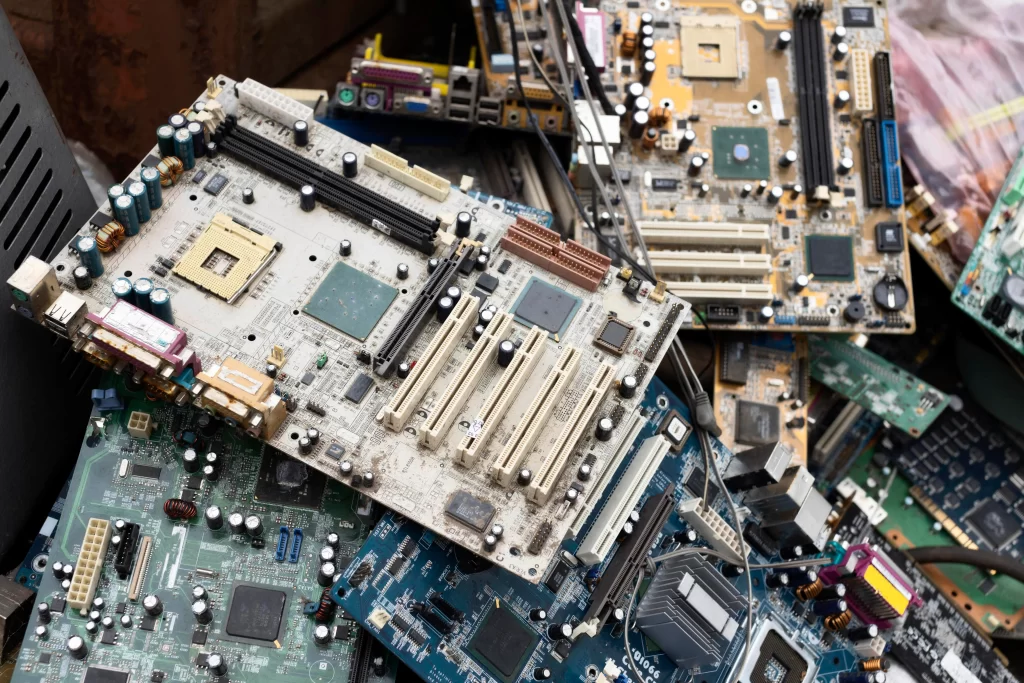When we talk about pollution, we can hear the words ‘e-waste’ buzzing more and more these days. But What exactly is e-waste? Benefits of recycling electronics, E waste recycling is disposal of electronic devices right from computer monitors, TVs, cables to mobile phones and even earphones dumping electronics. With the rapid growth in technology, we can see this e-waste growing faster than we can comprehend. According to the Environmental Protection Agency (EPA), the United States produced around 2.7 million tonnes of e-waste in 2020. This figure is expected to increase, highlighting the urgent need for effective e waste recycling and disposal.
This leads us to consider whether disposal and e-waste recycling are urgent necessities or merely future plans that can be gradually developed within the e-waste management sector.
Understanding E-Waste and Its Importance
E-waste disposal involves properly discarding electronic devices. With the big players in the computer and mobile industry like Apple and Samsung giving hard competition to hundreds and thousands of other brands, the increase in the variety of electronic products is natural. This trend is prompting people to upgrade to newer products more quickly, discarding any ‘old’ items as soon as a new one is released. This is how dumping electronics is piling up leading to e waste disposal.
The issue with this growth in technology is the dangerous impact of e waste on the environment and human health. E-waste recycling can be a hazardous process since many electronic devices contain metals such as lead and other chemicals that can react with water, air, and soil during the recycling process. These toxins can enter our food and water supply, posing severe health risks to humans and animals. In extreme cases, exposure to these substances can be fatal.

Addressing Data Security Concerns in E waste Recycling
One significant barrier to effective e waste disposal is the fear of data theft. Many people hesitate to recycle their old mobile phones and computers due to concerns about data security. However, there are secure methods for data destruction. We can even go for mechanically shredding or hydraulically disposal of electronic devices product to make sure our data is out of everyone’s reach in e waste computer recycling. In the same manner we have mechanical equipments from vehicles and machines that are also discarded and contribute to dumping electronics piling up.
The Benefits of E-waste Recycling
E waste recycling is not just about managing waste, it presents a significant opportunity. The e waste disposal and recycling industry is growing, and it is unlikely to saturate as technology continues to evolve. Precious metals like gold and silver are used in electronic components and often go to waste when devices are discarded improperly. By recycling these materials, we can reduce the need for mining new resources, thereby conserving natural resources and reducing environmental impact.
Opportunities in E-waste Management
Which brings us to the opportunity hidden in plain sight. E-waste disposal and recycling are a growing business industry right now and it will never saturate because technology will never die. There is a large amount of gold and silver used in making electronic chips that go into our tech products. These go to waste because we are not aware of the correct method of e-waste recycling.
Government Regulations and Initiatives
The United States has implemented various regulations to manage e-waste effectively. The Responsible Electronics Recycling Act (RERA) aims to regulate the export of e waste to developing countries, ensuring that it is processed in an environmentally sound manner. Moreover, individual states have their own e waste recycling programs and laws governing the proper disposal and recycling of electronic waste.
Corporate Responsibility and Consumer Awareness
Companies are also stepping up their efforts to address e-waste. Many tech giants have launched take-back programs to collect old devices from consumers and ensure they are recycled responsibly. These programs not only help lessen the environmental impact of e-waste but also enhance consumer trust and brand loyalty.
Consumer awareness is equally important. It is important to educate the public about the advantages of recycling e waste and the hazards of improper disposal so that more people will participate in recycling programs. Schools, community organizations, and media campaigns can play a vital role in spreading this knowledge.

The Impact of Technology on E-Waste Recycling
Innovations in technology are revolutionizing the e waste recycling process. The development of cutting-edge recycling methods, such as hydrometallurgical and pyrometallurgical processes, enables the efficient recovery of valuable metals from e-waste while minimizing environmental harm. Automation is also transforming the industry, as robotics and artificial intelligence enhance the sorting and dismantling of electronic devices, resulting in increased efficiency and reduced labor expenses.
Community Involvement and Local People Efforts
Grassroots initiatives and active community participation are vital for the success of e-waste recycling programs. Local communities can organize e-waste collection events, educate residents on proper disposal methods, and partner with recycling companies to ensure responsible processing of collected e-waste. Community driven efforts foster a sense of ownership and responsibility, motivating more individuals to engage in e-waste recycling.
Conclusion
Recycling electronic waste is not just essential; it’s also an industry brimming with potential for creating well-paying jobs. Recognizing the importance of properly disposing and recycling e-waste can significantly contribute to environmental conservation. By adopting e waste recycling practices, we can address the growing problem of electronic waste, preserve valuable resources, and ensure a healthier and safer environment for future generations.
In conclusion, recycling and properly disposing of e-waste are essential for managing the growing volumes of electronic waste. By appreciating the benefits and opportunities in this sector, we can move towards a sustainable future. Involvement in e waste management not only mitigates environmental issues but also offers promising career opportunities. As technology evolves, the demand for efficient e-waste recycling will continue to rise, making it an indispensable part of our contemporary world



